Insights from Editors and Judges
Summer 2013
Best of the Literary Contest Insider Interviews
We've compiled some favorite insights and responses from the contest judges we've interviewed during Literary Contest Insider's 12-year run. Read our best advice from editors at Perugia Press, New Millennium Writings, The Ledge, Writecorner Press, Rattle, Omnidawn, and more.
Spring 2013
Blas Falconer and Amy Wright
 Poetry editor and nonfiction editor of Zone 3. Founded in 1986, this twice-yearly journal is a publication of the Center for the Creative Arts at Austin Peay State University in Tennessee. Zone 3 sponsors three writing contests: the Zone 3 Literary Awards, with prizes of $250 apiece for poetry, short fiction, and essays (rolling deadline, entries accepted year-round); and the Zone 3 Press Creative Nonfiction Book Award and Zone 3 Press First Book Prize for Poetry, which alternate each year.
Poetry editor and nonfiction editor of Zone 3. Founded in 1986, this twice-yearly journal is a publication of the Center for the Creative Arts at Austin Peay State University in Tennessee. Zone 3 sponsors three writing contests: the Zone 3 Literary Awards, with prizes of $250 apiece for poetry, short fiction, and essays (rolling deadline, entries accepted year-round); and the Zone 3 Press Creative Nonfiction Book Award and Zone 3 Press First Book Prize for Poetry, which alternate each year.
"I think the growing interest in nonfiction is due, in part at least, to the Internet. Even as so many new avenues for connection opened up, readers and writers sought trustworthy frames to converse with and from within this oceanic thing. The essay is an incredibly viable medium for processing the unknown—as poems are, as drama and fiction are—but for something so daunting three genres was not nearly enough."
Winter 2012-13
 Rusty Morrison
Rusty Morrison
Co-editor of Omnidawn Publishing. Omnidawn has been publishing poetry since 2001, with Fabulist and New Fabulist Fiction added in 2006. Omnidawn offers three annual poetry manuscript contests: the Open Book Poetry Contest for a full-length manuscript by a writer at any stage of their career; the Poetry Chapbook Contest; and the First/Second Book Contest. In 2012, Omnidawn also launched a Fabulist Fiction Chapbook Contest.
"I think of the best manuscripts as a powerful constellation that makes a whole, yet it is often a unity born of growth, of evolving difference—I believe that each manuscript finds its center of gravity as it proceeds, and it teaches the reader to find that center as one makes one's way through the work. What constellates its wholeness might be an evolving subject matter, or not. It might be a cohering formal strategy, or not. I don't have preconceived notions about what the work must do, but I want it to be active in its work, as it engages my curiosity."
Fall 2012
 Rick Rofihe
Rick Rofihe
Editor of Anderbo. Founded in 2005, this online journal based in New York City sponsors several annual contests: the Anderbo Self-Published Book Award; the Anderbo Poetry Prize; the biennial Mercer Street Books Fiction Prize; and the RRofihe Trophy, a free contest for an unpublished short story.
"I certainly know that in a practical sense the paper book or journal or magazine or newspaper is already as obsolete as the vinyl LP-record is, especially when it comes to the time and costs devoted to their manufacture and, especially, distribution...As for content, probably shorter is better, but that might have as much to do with how much time to read that modern readers actually have, not so much with in which medium they're reading."
Summer 2012
 Timothy Green
Timothy Green
Editor of Rattle: Poetry for the 21st Century. Founded in 1995, this California-based poetry journal gives two annual awards: the $5,000 Rattle Poetry Prize and the Neil Postman Award for Metaphor, a $500 prize for the best use of metaphor in a poem published in Rattle during the year.
"I've seen many writers and editors shy away from that word [accessible], as if it implies a kind of inferiority—the poetics of the lowest common denominator. But when I speak of accessibility, I mean that by its actual definition: the capacity to be understood. To put it another way, a poem is accessible if all of the tools necessary for its use are included within the poem itself. There are no keyholes or passwords or combination locks; the only admission price is a solid grasp of the English language, or barring that maybe just the ability to use a dictionary. If I buy a patio set that comes with 80 hex screws and an Allen wrench, and that's all I need to put the thing together, then that patio set is accessible, even if it takes me all day and a bloody knuckle. If I open up the box and find that I also need a power drill, a miter saw, and a few years of experience as a carpenter, then that patio set is not accessible."
Spring 2012
 Kirstin Hotelling Zona
Kirstin Hotelling Zona
Editor of SRPR (Spoon River Poetry Review). This twice-yearly literary journal, now in its fourth decade of continuous publication, features contemporary poetry from around the world. Each issue includes a chapbook-length selection of work by an Illinois poet, with accompanying interview. Their annual Spoon River Poetry Review Editors' Prize awards prizes up to $1,000 for unpublished poems.
"SRPR's current dedication to 'place' may be better understood as an interest in emplacement—that is, the many ways we are situated in and through language, the earth, and each other; in and through our histories and our blind spots; in and through our protests and complicities. As such, a poetics of emplacement is interested in borders and thus borderlands; beings and ways of being that are often overlooked."
Winter 2011-12
 David Bright
David Bright
Editor of Gemini Magazine. Launched in 2009, this online literary journal publishes original poetry, fiction, and artwork by emerging talents. They offer three annual contests with a top prize of $1,000: the Gemini Magazine Poetry Open; the Gemini Magazine Short Story Contest; and the Gemini Magazine Flash Fiction Contest.
"Literature can definitely increase awareness that leads to social change...At Gemini we don't consciously seek out the underdogs, but they always seem to show up."
Fall 2011
 Elizabeth Wagner
Elizabeth Wagner
Assistant editor of Mississippi Review. Since 1978, this prestigious literary journal has been published by the Center for Writers at the University of Southern Mississippi. Their new editor-in-chief is poet Angela Ball. The annual Mississippi Review Prize offers awards of $1,000 apiece for unpublished poetry and short fiction, with publication for the winners and finalists.
"People who try to follow the trends never come to much good in our contest. We like genuine work, not copies of what seems to be selling that month."
Summer 2011
 Shanna McNair
Shanna McNair
Editor of The New Guard literary review. Founded in 2009, this Maine-based journal offers two annual contests with prizes of $1,000 each: the Machigonne Fiction Contest for literary or experimental fiction, and the Knightville Poetry Contest for narrative or experimental poetry.
"I feel that there is a certain kind of academic taste permeating the publishing industry right now, which I believe stems from the Great Advent of the Graduate School Writing Program. I mean, I'm one to talk—I'm in an MFA myself. Legibility, however, doesn't seem to be as important as style these days. I'll put it like this: I have a background in journalism—and my first editor advised me to write to the general population as though they were readers on the seventh grade level. I think the populace is smarter than seventh grade, for crying out loud. Anyway I'd say write to an audience for legibility, but write to the smartest people and the seventh graders at the same time. Let's not sell anybody short."
Spring 2011
 Frances Everitt
Frances Everitt
Administrator of the Bridport Prize. Launched in 1973 at the Bridport Arts Centre in Dorset, England, the Bridport Prize is one of the largest and most prestigious English-language creative writing awards, with prizes up to 5,000 pounds for unpublished poems and short stories and 1,000 pounds for flash fiction. Today many thousands of entries are received from over 80 countries worldwide. Notable writers who won the Bridport Prize at the start of their careers include Kate Atkinson and Tobias Hill.
"Every year, the main themes (our competition is open, i.e., you can write about anything) that come through from the writers are universal: love, death and war. Reading them can make you feel quite despondent! Several of our judges have commented on the lack of humour in the stories and poems: 2010 fiction final judge Zoë Heller said, 'I was disappointed by the paucity of humour...very few of them took the risk of striking a comic note. 2011 entrants, please take heed: making a reader laugh does not compromise your claim to being taken seriously as a writer of literary fiction.'"
Winter 2010-11
 Nancy White
Nancy White
Administrator of the Word Works Washington Prize. Established in 1981 as an individual-poems contest, the Washington Prize became an annual book-length poetry manuscript prize in 1988. Winners have included Enid Shomer, Fred Marchant, John Surowiecki, Frannie Lindsay, and Brad Richard.
"Those [finalist] manuscripts have several things in common. The manuscript is in some way highly cohesive; it has no "weak links" among the poems; and it is both truly interesting and truly well crafted. There is no self-indulgence left in the book."
Fall 2010
 Jill Hoffman
Jill Hoffman
Editor of Mudfish. This well-regarded journal of poetry and artwork is published by Box Turtle Press, a small press in New York City's Tribeca neighborhood. 2010 will be the 10th year of the Mudfish Poetry Prize, which offers $1,000 for unpublished poems of any length. The final judge will be Mark Doty. Authors recently published in Mudfish include Jesslyn Roebuck, Rebecca Foust, Michelle Bitting, Paula Brancato, Michael Montlack, Ronald Wardall, Arielle Greenberg, and Simon Perchik.
"The title of Mudfish, a journal of art and poetry, derives from the Nigerian storyteller's stool, composed of two interlocking mudfish....To me, it represented the magazine's interlocking of art and poetry; and also expressed my penchant for poetry as story, as very concise and intimate storytelling. I like to think of a poem as a miniature novel, and I like to think of the poet as a storyteller."
Summer 2010
 Lori Desrosiers
Lori Desrosiers
Editor of Naugatuck River Review. Launched in 2009, this literary journal based in Western Massachusetts specializes in contemporary narrative poetry. Contributors have included Lesléa Newman, Taylor Mali, Pamela Uschuk, Penelope Scambly Schott, Doug Ramspeck, Christina Lovin, and Thomas R. Moore. Naugatuck River Review offers an annual Narrative Poetry Contest with a top prize of $1,000. Many runners-up are also published.
"I like to define narrative poetry as a poem with a sense of story, not necessarily the entire story. It could be a story of a moment, or have an implied story. A good narrative poem should be well-crafted, have a compressed narrative, a strong emotional core and be lyrical (after all, it's poetry!)."
Spring 2010
 Ander Monson
Ander Monson
Editor of DIAGRAM. Published by New Michigan Press since 2000, this distinctive online journal features innovative and genre-bending poetry and prose, alongside "found art" consisting of diagrams from obscure reference works. DIAGRAM offers three annual contests. The Diagram Innovative Fiction Contest (most recent deadline was March 8) offers $1,000 for a story up to 10,000 words. The New Michigan Press/Diagram Chapbook Contest offers $1,000 for manuscripts of poetry, prose, or mixed-genre work. The Diagram Hybrid Essay Contest offers $1,000 for essays that are in some way outside the traditional boundaries of the genre, such as a fusion of prose with poetry or audiovisual elements.
"It's hard to explain what makes [a diagram] a perfect fit for us, but it has something to do with how it works outside of context, as you suggest. We also love intricacy and people trying to diagram ridiculous or hilarious things, preferably with an entirely straight face. And we love beauty. And invention. And a good piece of writing needs all those things: to work in and out of context, to be strange (as all good art is) and beautiful. Or, rather, good art creates its own context and exceeds the boundaries that it starts out being contained by."
Winter 2009-10
 Jenine Bockman
Jenine Bockman
Co-editor/publisher of Literal Latté. This online journal offers five annual writing contests: the Fiction Awards (deadline January 15), the Food Verse Contest (January 31), the Short Short Contest (June 30), the Poetry Awards (July 15), and the Essay Awards (September 15). Top prizes are $500 for flash fiction and food verse, $1,000 for the other three contests.
"I always say a great meal comes in a feast of flavors and textures and we try to achieve that in Literal Latté. We don't accept issue by issue. We accept what we love and put together a tasty combo each issue from what we have. There is not any style that would not be appropriate. Literary horror, intelligent children's stories...we love to find great writing in any flavor."
Fall 2009
 Timothy Monaghan
Timothy Monaghan
Editor-in-chief and publisher of The Ledge Magazine & Press. This independent literary publisher, based in Bellport, NY, offers three annual contests, each with a top prize of $1,000: The Ledge Fiction Awards for unpublished short stories (deadline February 28), The Ledge Poetry Awards for unpublished poems (April 30), and The Ledge Poetry Chapbook Competition (October 31).
"I admire the ambition of formal poets who transcend tradition with a more modern approach or interpretation while remaining true to the form itself....Formal poetry doesn't have to be academic or stuffy, but can be just as visceral as the most provocative free verse poem."
Summer 2009
 Pamela Uschuk
Pamela Uschuk
Editor-in-chief of Cutthroat, A Journal of the Arts. Cutthroat, a publication of the Raven's Word Writers Center in Durango, CO, offers two annual literary contests with prizes up to $1,250: the Joy Harjo Poetry Award and the Rick DeMarinis Short Story Award.
"What is great literature? Great writing makes us think and consider and question our assumptions, dogma and prejudices. Great writing makes us laugh while it flays us."
Spring 2009
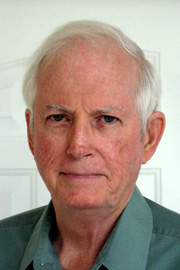
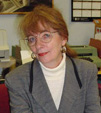 Robert B. Gentry & Mary Sue Koeppel
Robert B. Gentry & Mary Sue Koeppel
Editors of Writecorner Press. This writers' resource website offers the Writecorner Press Annual Poetry Award ($500 top prize, deadline March 31) for unpublished poems up to 40 lines, and the E.M. Koeppel Short Fiction Award ($1,100 top prize, deadline April 30) for unpublished stories up to 3,000 words. Winners and runners-up are published online. Student entrants to the fiction prize are also eligible for the $500 P.L. Titus Scholarship.
"We...ask these questions about each submission: Is it interesting? Does it make you want to read on and on, whether or not you identify with the characters? Is it skilled in foreshadowing and use of time? Does it give fresh insight into the human condition? Whatever the nature of the subject matter, is it aesthetically pleasing? Is the plot—complex or simple—consistent with every other element of the story: character, setting, theme, point of view, diction, etc.? Do all of these elements of the story work together and illumine each other?"
Winter 2008-09
 Leah Maines
Leah Maines
Senior Editor of Finishing Line Press. Founded in 1998, Finishing Line is located in the Bluegrass region of central Kentucky. The press runs two annual contests: the New Women's Voices Chapbook Competition for women authors with no published books (deadline February 15) and the Finishing Line Press Open Chapbook Competition (usual deadline June 30, extended last year to July 15). Up to 10 finalists from each contest are also offered publication.
"I've always been a big fan for getting out there and promoting yourself. I think it is very important for poets to get connected. Have a website. Join poetry groups. Do readings. Join Facebook. When you have gigs, send out press releases to your local newspapers, TV stations and radio stations. I have been in newspapers and on many local TV shows and radio stations just because I sent our press releases."
Fall 2008
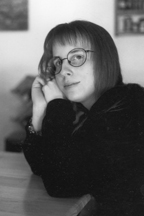 Dana Curtis
Dana Curtis
Editor-in-chief of Elixir Press. Founded in 2000, this independent press based in Denver, CO offers an annual open poetry manuscript contest, the Elixir Poetry Awards (deadline October 31), with prizes of $2,500 and $1,500 plus publication. In addition, the Elixir Press Fiction Award of $2,000 for unpublished novels and short story collections is offered, with the Elixir Antivenom Poetry Award of $2,000 for poetry manuscripts.
"I get a lot of manuscripts that are technically proficient—even brilliant—but seem to have no human component. I would like to see work that is obviously written by people who have, at some point their lives, felt some sort of an emotion. There seem to be a lot of people out there who are editing the humanity out of their work. I say editing because I don't believe that people start out being so flat. Perhaps they're trying to avoid poetry/fiction as therapy. It's a good thing to avoid, but let's not go overboard."
Summer 2008
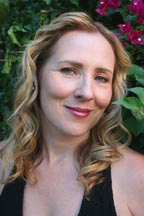 Kate Gale
Kate Gale
Managing editor of Red Hen Press. Since 1994, this California-based independent press has sought to publish poetry, literary fiction and nonfiction by diverse writers whose work might be overlooked by commercial publishers. Red Hen Press offers three annual contests: the Red Hen Press Short Story Award of $1,000 for stories up to 25 pages (deadline June 30), the Red Hen Press Poetry Award of $1,000 for poems up to 120 lines (September 30), and the Benjamin Saltman Poetry Award of $3,000 for a full-length poetry manuscript (October 31).
"We like dark. Strange. Underneath. I like reading what isn't there. I like to look for the hidden staircase, the attic voice, the cellar voice, the story that hasn't been told. I'm not interested in urban, slick, out loud, cool, hip. I want to publish the next Kafka, the next Jean Rhys."
Spring 2008
 Francine Ringold
Francine Ringold
Editor-in-Chief of Nimrod International Journal. Founded in 1956 at the University of Tulsa, this well-regarded journal of poetry and prose offers the annual Nimrod/Hardman Literary Awards, a prestigious awards program that marks its 30th anniversary in 2008. The Katherine Anne Porter Prize for Fiction and the Pablo Neruda Prize for Poetry offer prizes of $2,000 and $1,000 for an unpublished short story, 7,500 words maximum, or 3-10 pages of poetry.
"Often when we make suggestions for revision, they are not fulfilled to our satisfaction. Even when the suggestions are not made by our editorial staff and the writer revises already accepted material, he or she seems to take the heart out of the piece. We accept revisions to accepted material only at our discretion. Usually we take the version we accepted originally, especially for the prize. Only minor revisions are accepted on award-winning material. After all, the original version we received was the version that was accepted and awarded."
Winter 2007-08
 Sarah Gorham
Sarah Gorham
Editor-in-Chief of Sarabande Books. Founded in 1994, this Louisville, KY-based independent press offers two annual book-length manuscript contests, the Kathryn A. Morton Prize in Poetry and the Mary McCarthy Prize in Short Fiction. Both contests offer $2,000 and publication.
"We are not impressed by wild, clever pyrotechnics in syntax, grammar, vocabulary or structure, because doing so is hip by some political or other exterior measure. We look for a poem or story that magnetically possesses a combination of music, thought and feeling. The syntax, grammar, etc. grow naturally out of that combination."
Fall 2007
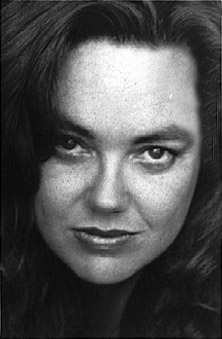
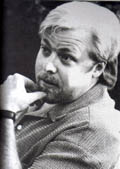 Caron Andregg & Robert Wynne
Caron Andregg & Robert Wynne
Co-Editors of Cider Press Review. This independent literary journal based in Halifax, PA was launched in 1999 to showcase high-quality new poetry from all over the country and the world. Their published authors have included a Pulitzer Prize winner (W.D. Snodgrass) and others who would go on to become Guggenheim Fellows and National Book Award finalists. Recent issues have featured such poets as Diane Lockward, Ryan G. Van Cleave, Charles Harper Webb, and Paul Willis. The Cider Press Review Annual Book Award offers $1,000 and publication for a full-length poetry manuscript. The contest is open to all authors. Past winners were Carla Panciera, Don Colburn and Anne Caston.
"There is a clear and immediately-visible difference between sentences constructed by an author who just throws in a bunch of adjectives in an attempt to force an almost-right noun to convey meaning, and that crafted by an author willing to put in the hours, days, and sometimes years necessary to find exactly the right verb. A really well-crafted manuscript will sing in its own voice without having to rely on cheesy word-play or other stylistic tricks."
Summer 2007

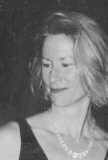 Shannon Cain & Lisa Bowden
Shannon Cain & Lisa Bowden
Co-Directors of Kore Press. This Tucson-based independent press was established in 1993 to publish literature by women. "Kore", Greek for "daughter", is another name for Persephone, the goddess who was said to cause the changing seasons through her descent into and re-emergence from the underworld. The founders of Kore Press, Lisa Bowden and Karen Falkenstrom, chose the name to symbolize their vision of women as agents of change, conceived as both literary innovation and social progress. The Kore Press First Book Award (deadline July 31) offers $1,000 and publication for a poetry manuscript by a female writer who has not published a full-length collection of poetry. The Kore Press Short Fiction Award offers $1,000 and chapbook publication for a short story by a woman.
"We don't look for work that's specifically about women's issues, but when women write well and honestly about their lives, well...then their stories become universal and thus about women's issues. Really good socially-engaged fiction and poetry, for me, works the same way: when a writer attends to her craft and is unflinchingly honest, and when she combines that skill and truthfulness with an awareness of the larger world, the work becomes inherently political."
Spring 2007
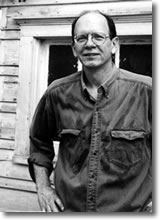 Robert Stewart
Robert Stewart
Editor of the literary journal New Letters, a publication of the University of Missouri-Kansas City. Since its founding in 1934 (then known as The University Review), New Letters has published authors such as May Sarton, J.D. Salinger, Marianne Moore, Joyce Carol Oates, Tess Gallagher and Richard Wright. The companion radio program New Letters on the Air celebrates its 30th anniversary this year, making it the longest continuously-running broadcast of a national literary radio series, with more than 1,200 episodes. New Letters sponsors three prestigious annual literary awards, each with a $1,500 prize and a deadline of May 18, 2007: the New Letters Prize for Poetry, the Dorothy Churchill Cappon Prize for the Essay, and the Alexander Patterson Cappon Prize for Fiction.
"Robert Frost said that the study of literature is one of the few areas in life where one is asked to exercise taste and judgment. My taste runs toward fiction, poetry, and essays that care about the emotional and spiritual dilemmas of human beings. That statement will suggest to some readers here that we want conventional sentiment, which is out of the question. We want eccentric and innovative writing. However, I notice a tremendous amount of published writing in journals that falls more toward the so-called lyric essay, language poetry, or postmodern fiction. The truth is, I like all of that in principle; but I need to see how it matters on a human level. If it seems like mere typographic game playing, or word games, I respond less well to it."
Winter 2006-07
Rebecca Wolff
Editor of Fence Magazine and Fence Books. Fence Magazine, a biannual journal of poetry, fiction, art and criticism, was founded in 1998 with a mission to publish challenging writing and art distinguished by idiosyncrasy and intelligence rather than by allegiance to camps, schools, or cliques. Fence Books offers two annual poetry manuscript contests: the Ottoline Prize (formerly the Alberta Prize, then the Motherwell Prize), a $5,000 award for a second book by a woman; and the Fence Modern Poets Series, which is open to all poets and offers a $1,000 award.
"What frustrated me, as a young poet, enough to make me want to start my own magazine, was the seeming lack of appreciation, lack of apprehension, among mainstream readers and writers, for developments in the art form that have taken place not over the last ten or fifteen years, but over the last hundred or so....I suppose that if I were to recommend any particular reading to readers hoping to gain a better grip on the work being done now, it would be to suggest that they take themselves on a reading tour of what I have always called 'Precedents' (we used to have a feature in the magazine in which we would simply reprint some old gem of earlier writing that was clearly related to the 'experimental' work everyone thinks is so darned nutty): read your Walt Whitman, read your Dickinson, your Stein, your Stevens, your Mina Loy and Charles Olson, Creeley and Niedecker and Berryman, O'Hara, Notley, Coolidge, Welish, and then renew your subscription to Fence."
Fall 2006
Rodger Moody
Editor of Silverfish Review Press. Founded in 1978, this independent literary press based in Eugene, Oregon offers the Gerald Cable Book Award, an annual poetry prize that offers $1,000 and publication for a poet's first collection.
"Poets, especially younger poets early in their careers, may be surprised to learn that publishers expect them to take an active role in the distribution of a book. In other words, writing the book isn't the end of an author's responsibility for the life of the book. It may be difficult for some authors to learn that promotion and distribution are, in part, a shared undertaking. Winning a first-book contest may not make a poet's life easier, though it may make it richer by drawing them closer to the culture of the book."
Summer 2006
Bruce Wilcox
Director of the University of Massachusetts Press. Based in Amherst, Mass., UMass Press sponsors the prestigious Juniper Prizes for Poetry and Fiction. The Juniper Prize for Poetry, established in 1975, alternates between a first-book contest in odd-numbered years and a contest for manuscripts by authors with prior book publication in even-numbered years. The Juniper Prize for Fiction, launched in 2004, seeks book-length collections of literary fiction, which can be novels or collections of short stories and novellas.
Mr. Wilcox sees hope amid the wilderness. "It does seem to me that the large corporate publishers—the managers of the literary-industrial complex—are devoting less and less attention to serious literary work. And yet in the age of the Internet, writers now have new channels at their disposal, new ways to be published. There are dozens of literary contests, small presses sprouting up all over the place, and any number of websites where poetry and fiction are posted. Those are positive developments."
Spring 2006
Susan Terris & CB Follett
Editors of the literary journal RUNES, A Review of Poetry. Each annual issue of RUNES has a one-word theme that the 100 featured authors interpret in a wide variety of literal, metaphorical and suggestive ways. Established in 2000, the magazine has published well-known authors such as Lucille Clifton, Li-Young Lee, and Richard Wilbur, as well as many emerging writers. The theme for their 2006 issue will be "Hearth".
"We're always looking for strong metaphorical interpretations of our themes: the 'Storm' of butterflies or of a marriage; the 'Signal' of a carving in a tree trunk or of a cut green bean vomited after chemotherapy. But, that much said, we always want some poems that hit the theme directly. We wanted a car poem for 'Memory' and a literal detective poem for 'Mystery'. We will probably want a poem about a fire in a hearth for 'Hearth'—but only one, an outstanding one."
Winter 2005-2006
M. Scott Douglass
Publisher and editor of Main Street Rag. Main Street Rag Publishing Company has been producing its print journal since 1996. The press sponsors well-regarded annual contests for poetry chapbooks (deadline May 31) and full-length poetry manuscripts (deadline January 31). Poets published in this series include Pam Bernard, Jay Griswold, Mary Christine Delea, and Susan H. Case. In addition, MSR's bindery division offers printing and book packaging services to authors and other publishers.
"A poet," says Douglass, "should factor in the likelihood of being published and weigh that against reading fee. The prestige of publisher (I think) leans toward elitist thinking, but let's face it, there are some contests that will do more for the author's reputation and resume than others. What they should factor in—again—is the likelihood of winning: the higher prestige the contest, the greater the competition. I'm a big believer in allocating funds toward probable success and working your way up the food chain."
Fall 2005
Robert Nazarene
Editor of MARGIE: The American Journal of Poetry. MARGIE is a well-respected literary journal that sponsors several contests per year for individual poems and poetry manuscripts.
"We have no bias in either direction for formal poetry, free verse, blank verse, (there are no wrong topics), accessible or experimental work. We are biased against boring poetry — which is, often as not, terribly well-crafted. And I do mean terribly. "
Summer 2005
Kris Christensen
Editor of Rock & Sling: A Journal of Literature, Art, and Faith. Rock & Sling showcases visual art and literature "with broad or explicit associations to Christian faith or its history." It sponsors the Virginia Brendemuehl Prize for Poetry.
"Personally, we've each taken some heat over Rock & Sling. [Fellow editors] Susan and Laurie have had Christian friends challenge their involvement in Rock & Sling, going so far as to say they are "working against God" because we are not evangelizing. I've had friends assume that my interest in Christianity means I've checked my intellect at the door. I don't think this gap can be closed by the entrenched parties. It will require a third group, a new contingent of artists and patrons, to reunite art and faith."
Spring 2005
Corinne Lee
Owner and Publisher of Winnow Press. Winnow Press sponsors a chapbook contest and two full-length manuscript contests, one of which is a first-book prize and the other an open competition.
"At Winnow Press, we can tell that countless entrants are unaware of contemporary poetry. Their manuscripts are full of quotes from 'canon' poets like Tennyson and Browning; many of their poems include rigid end rhymes; and few, if any, of their poems deviate from narration. We're open to those manuscripts — indeed, it would be wonderful to find such a manuscript that was so superb we wanted to publish it — but authors should be cognizant of placing themselves among the thundering herd."
Winter 2004-2005
John H. Reid
Author of Write Ways to Win Writing Contests and the force behind the Tom Howard Poetry and Short Story Contests and the Margaret Reid Poetry Contest.
"Many entrants are peculiarly one-eyed when it comes to judging the worth of their own work. In poetry contests, the writers of doggerel, particularly religious doggerel, seem to regard the worthiness of their subject matter as imparting an automatic uplifting quality to hackneyed sentiments and trite aphorisms. It takes real talent to write religious, political or polemical verse well."
Fall 2004
Vince Gotera
Poetry Editor of North American Review. NAR, America's oldest literary magazine, sponsors the James Hearst Poetry Prize, an individual-poems contest with a top prize of $1,000 and publication.
"People who say Mary Oliver or Billy Collins are talking down to readers have an elitist notion of what poetry is and for whom it exists. Poetry should be accessible to all readers who want to put in the time to understand it. If that means some poetry is difficult and scholarly, so be it—those writers will find a readership. If other poetry is accessible and down-to-earth, great—those poets will also have an audience."
Summer 2004
J.P. Dancing Bear
Founder and editor of Dream Horse Press. The press offers the National Poetry Chapbook Prize in May (formerly August) and two full-length manuscript contests, the Orphic Prize for Poetry in October (formerly May) and the American Poetry Journal Book Prize in February.
"I enjoy a manuscript that displays a poet's maturity of thought and sense. I also want a complete yet sleek manuscript; a shorter manuscript with only a poet's best poems is more likely to do well here than a longer manuscript with all of the poet's poems. Leave the reader wanting more rather than feeling tired."
Spring 2004
Alicia Ostriker
This renowned poet was the guest judge of the 2004 poetry manuscript contest from Autumn House Press. Located in Pittsburgh, Autumn House describes its mission as "publishing the work of excellent contemporary writers who have a following among readers, but whose work has been overlooked by commercial publishers."
"Political poetry gets a bad rap, I think, because of its potential to be disturbing. Most people, including many poets and many critics, want poetry to be nice and not rock any boats. Erotic poetry, passionate poetry, powerfully personal poetry of ANY kind tends to be sneered at. This bothers me much more than the fact of supposedly 'bad' political poetry, which is probably no more "bad" than lots of other poetry. Yes, some political poetry is time-bound, single-issue-related, and therefore won't last fifty years, but so what? If politics is as real and complicated to you as your love life or the death of your grandmother, or whatever, you just go for it and do what you can. All life, including public life, is raw material. You make art out of it. The one piece of advice I would give is: If you find yourself thinking in terms of 'us' versus 'them', give it up."
Winter 2003-2004
Jeffrey Levine
Founder and editor-in-chief of Tupelo Press. This well-regarded independent publisher offers three poetry manuscript prizes: the Snowbound Series Poetry Chapbook Competition, the Tupelo Press Poetry Contest for a first full-length book, and the Dorset Prize, a full-length book contest open to all poets regardless of publication history.
"[The poet should] make sure that that work in the manuscript is, in fact, her very best work. She must trust herself, though. Not the editors of this or that national magazine or journal who have kissed a poem, but the poet must be satisfied that the poem deserves to enter her book on her terms. So many poets are in love with the acknowledgments page. I suggest that she find the poems that work, and work together. I suggest that she not substitute some editor's aesthetics for her own. Finally, she must see to it that the poems talk to each other, that they form a book. There's a lot of communing with the unconscious there, but it's not all voodoo. Listen to the poems. They'll tell you what."
Fall 2003
Morgan Kenney
Founder and judge of Britain's prestigious Petra Kenney Poetry Competition, which awards prizes up to 1,000 pounds for unpublished poems.
"Emotion is a common stimulus to write poetry, and yet words fail to capture feeling. Poems that try to describe the actual emotional state of the poet become embarrassing confessions. The magic of poetry disappears under overstatements. Poems that hit the reader in the emotional gut are those that bounce the feelings off some inanimate object that represents the relationship or expresses the philosophic idea about society."
Summer 2003
Kevin Walzer
Co-editor of WordTech Communications. At the time of this interview, WordTech sponsored about a dozen poetry manuscript contests through imprints such as Word Press, David Robert Books, Turning Point and Cherry Grove. WordTech's various imprints have published such authors as Jendi Reiter, Allison Joseph, Rhina Espaillat, Barbara Crooker, Ann Silsbee, and J.P. Dancing Bear.
"In our experience, the poet is the single biggest driver of sales of his or her book. A publisher can send out flyers, list the book on a website, and advertise if the dollars are there, but it is the poet that creates his or her audience, and it is the poet's audience who will buy the book. Doing readings and signings is probably the best way to market the book. Our best-selling titles are those by poets who are very energetic in doing these kinds of performances. Poets can give readings at bookstores, libraries, coffeehouses, schools; there are many areas of the community that are interested in poetry and might support this."
Spring 2003
Don Williams
Editor of New Millennium Writings. This attractive journal runs two contests per year for poetry, fiction, and essays, offering $1,000 in each genre.
"There seems to be a bias in certain quarters against anything affirmative of human warmth and fellowship and notions of redemption and transcendence or any sense of mystery, wonder or awe at the universe. Yet in society at large these earthy, organic strands are everywhere pulling us back to acknowledge a mystery in the cosmos that the latest findings in particle physics and cosmology only strengthen. So, yes, NMW is open to all sorts of literary exploration and expression. The universe is certainly a lively and brilliant and many-faceted place. For any of us to have existence at all is so fantastic it's like winning 500 million lotteries in a row. Our own existence—maybe the universe as a whole—is that unlikely. Let's celebrate it."
Winter 2002-2003
Dr. Edmund Skellings
Poet Laureate of Florida and the 2003 judge for the Laura (Riding) Jackson Foundation's "The Nature of Nature" Environmental Poetry Contest.
"Most poets are afraid to venture from the back room of the house into the parlor. On top of that, they are also afraid of themselves. Many do not fly. There is high level of cowardice in the academic world and it tries to risk little. Of course, there are exceptions and that usually indicates a long-term success. I have been attacked (really!) for composing on an electric typewriter, for reciting my poetry aloud to groups, for being the first poet to bring out a record-book which had LP's in the cover, for using computers to type poems upon. I feel sorry for all those poets because the typewriter is now obsolete and no more are being made. I like technology and even go from poetry reading to poetry reading, flying my own airplane. New generations are television generations and at least I will have left them some poetry to watch and listen to."
Fall 2002
Susan Kan
Editor of Perugia Press. This Massachusetts-based publisher of women's literature offers the Perugia Press Intro Award for poetry manuscripts by American women with no more than one published book.
"I strongly believe that the more we listen to women's interpretations, the better off we'll be. I am looking for well-crafted, musical, fresh voices that tell compelling stories. If you read the books I've published, I think you'll see that the voices I'm drawn to are writing about women's experiences, but not in a heavy handed or apologetic way. Women will love these books, and so will men. I don't think any man would read one of these books and dismiss it as irrelevant to him. The world will improve, I believe, with the sound of more women's voices. "
Summer 2002
Carolyn Moore
Workshop Leader, "Confessions of a Contest Junkie". In the past fifteen years, Carolyn Moore has won over 60 awards and honors for her writing. Her workshop teaches poets about how poetry contests judge submissions and how to identify scams.
"Many contests announce that they seek 'the best single poem' yet take all three (or four or five or ten) of a poet's poems and staple them together under a single entry number. Too often this results in the weakest poem in the batch ruining the chances of the strongest....Since most poetry contests I polled about eight years ago use the 'lump' system, poets should take care to only send their strongest work, even if it means they are sending only two poems for the price of three."
Spring 2002
Marilyn Johnson & Lisa Glatt
Johnson is the editor and publisher of Pearl Editions, and Glatt is a published poet who is judging their 2002 poetry manuscript contest.
Johnson says: "Pearl Editions leans toward poetry that speaks to real people about real life in direct, living language. Unfortunately, most people are convinced (and not without reason) that poetry is so difficult and obscure, they have to be literary scholars to understand and appreciate it. Part of Pearl's raison d'etre is to show that poetry doesn't have to be that way—that it can be accessible, readable, and even entertaining."
Winter 2001-2002
David Baratier
Editor of Pavement Saw Press. Pavement Saw's chapbook prize offers $500 and 50 copies. The Transcontinental Poetry Award accepts manuscripts from authors with no prior book publication.
"If one only wants one's book published, then self-publish. If one wants a distribution network which is already well-established, then a chapbook or full-length book contest may be a good route. Chapbooks are often the gateway to a full-length book but only if they are well-distributed."








